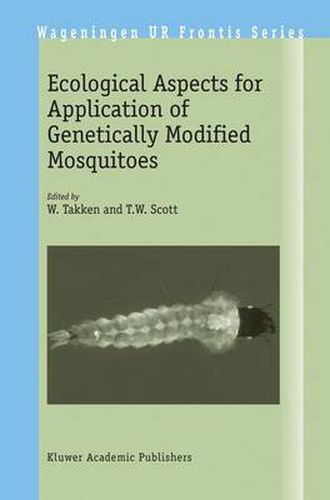Readings Newsletter
Become a Readings Member to make your shopping experience even easier.
Sign in or sign up for free!
You’re not far away from qualifying for FREE standard shipping within Australia
You’ve qualified for FREE standard shipping within Australia
The cart is loading…






This title is printed to order. This book may have been self-published. If so, we cannot guarantee the quality of the content. In the main most books will have gone through the editing process however some may not. We therefore suggest that you be aware of this before ordering this book. If in doubt check either the author or publisher’s details as we are unable to accept any returns unless they are faulty. Please contact us if you have any questions.
New interventions are needed to reduce the burden of vector-borne diseases like malaria and dengue, which are among the most serious and prevalent infectious diseases worldwide. The release of genetically modified (GM) mosquitoes may offer an alternative strategy to do so while circumventing the pitfalls of current vector control methods. Contemporary methodologies are stalling because of drug resistance, absence of vaccines and inadequate mosquito control techniques. GM mosquitoes have been developed that are resistant to pathogen infection and transmission, but the public-health and environmental consequences of releasing such insects are unclear, mainly because of a lack of knowledge of the ecology and population biology of mosquitoes. This book is the reflection of a workshop, held in June 2002, that addressed these issues. Experts on mosquito ecology met to discuss the current knowledge of mosquito ecology with respect to GM-insect technology. Emphasis of the workshop was on evaluating how human health and natural ecosystems, including target wild-mosquito populations, will respond to the invasion of GM vectors. This volume should stimulate discussion by clearly showing the importance of vector ecology for prevention of vector-borne diseases.
$9.00 standard shipping within Australia
FREE standard shipping within Australia for orders over $100.00
Express & International shipping calculated at checkout
This title is printed to order. This book may have been self-published. If so, we cannot guarantee the quality of the content. In the main most books will have gone through the editing process however some may not. We therefore suggest that you be aware of this before ordering this book. If in doubt check either the author or publisher’s details as we are unable to accept any returns unless they are faulty. Please contact us if you have any questions.
New interventions are needed to reduce the burden of vector-borne diseases like malaria and dengue, which are among the most serious and prevalent infectious diseases worldwide. The release of genetically modified (GM) mosquitoes may offer an alternative strategy to do so while circumventing the pitfalls of current vector control methods. Contemporary methodologies are stalling because of drug resistance, absence of vaccines and inadequate mosquito control techniques. GM mosquitoes have been developed that are resistant to pathogen infection and transmission, but the public-health and environmental consequences of releasing such insects are unclear, mainly because of a lack of knowledge of the ecology and population biology of mosquitoes. This book is the reflection of a workshop, held in June 2002, that addressed these issues. Experts on mosquito ecology met to discuss the current knowledge of mosquito ecology with respect to GM-insect technology. Emphasis of the workshop was on evaluating how human health and natural ecosystems, including target wild-mosquito populations, will respond to the invasion of GM vectors. This volume should stimulate discussion by clearly showing the importance of vector ecology for prevention of vector-borne diseases.